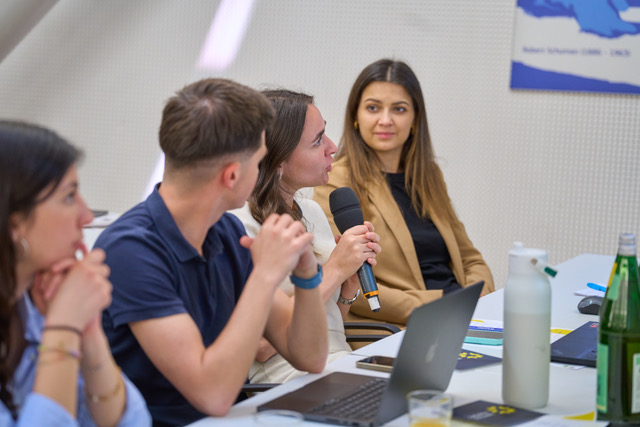On 30th April, United Europe’s Young Leaders Advocacy Seminar took place in partnership with the Representation of the European Commission in Austria. 30 Young Leaders from across the European continent were hosted in the House of the European Union in Vienna and discussed what’s next for Europe after a decisive election year in 2024.
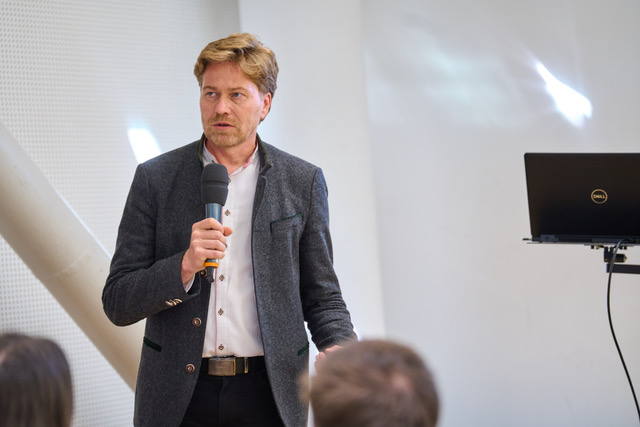
Impulse by Professor Volker Wittpahl, „AI, Disinformation and Stargate – What Global Threats is the European Economy facing?” In 2022, a fake video call between the mayors of Kyiv and Berlin, orchestrated by a comedian using deepfakes technology, exposed the vulnerability of even high-level officials. In another case, an AI-generated avatar duped a company into transferring USD25million to a fraudulent account. These are not just examples of online disinformation – they are indicators of a much broader threat.
AI operates on pattern recognition. Today, self-learning algorithms with feedback loops are becoming increasingly powerful due to the data they are fed.
From an economic perspective, the most valuable subject to monitor is the buyer – people themselves. Human behavior forms the most interesting and profitable dataset. Data brokers play a central role in this ecosystem. Acxiom, for example, reportedly held 3000 attributes on 7 million individuals across the US, Europe and beyond. Oracle, as of 2017, claimed to manage 30,000 attributes on 2 billion consumer profiles globally.
The data marketplace once known as Xandr (acquired and renamed by Microsoft) offered detailed customer profiles for hyper-targeted advertising. Even after the name disappeared in 2022, the business model persisted. Data brokers enrich profiles by purchasing information from various companies, including those within the EU. One common method of data collection is through mobile apps: upon installation, apps share a so-called “advertising ID” with data brokers. Firms like Data Stream aggregate this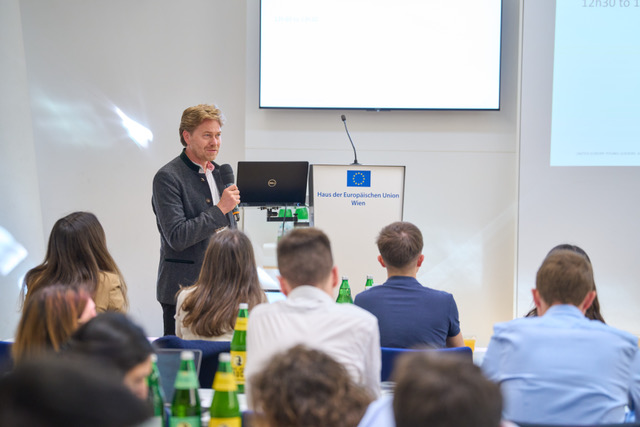 data and sell access – for instance, a €14,000 monthly subscription grants live data streams from over a million ad IDs.
data and sell access – for instance, a €14,000 monthly subscription grants live data streams from over a million ad IDs.
A sample purchased from one of these brokers allowed investigators to trace employees from the BND (Germany’s federal intelligence service), Bundeswehr (military), and even members of parliament – identifying their home addresses, routines, and online habits. This is not a dystopian prediction; it’s a reality we’ve been living with for the past decade.
Every digital interaction – clicks, visits, likes, comments – is tracked, locked, and analyzed. This profiling determines not only the ads you see but potentially your access to services like insurance. A poor health profile may lead to denial of coverage.
AI introduces a new age of automated influence. Algorithms can now manipulate public opinion – pushing individuals toward belief in conspiracy theories or pulling them back from the brink. In controlled studies, fact-based chatbots have even managed to change the minds of conspiracy theorists.
This raises grave concerns for democracy. The tools of manipulation are becoming more refined. Trust in digital media is eroding. With AI, it is now possible not only to create fake news, but also to propagate it across hundreds of fabricated websites – making fact-checking virtually impossible. Meanwhile, phishing scams and spam emails are becoming indistinguishable from legitimate communication, escalating the threat.
We are not simply facing a technological shift, we are facing a fundamental transformation in how truth, influence, and privacy operate in society.
Q&A
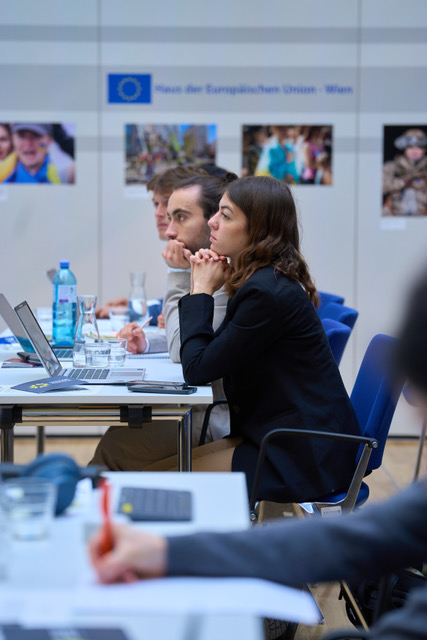 What are the risks of not investing in AI and how can we counteract disinformation created by it?
What are the risks of not investing in AI and how can we counteract disinformation created by it?
Significant progress has been made. Large Language Models (LLMs) are now available as open-source tools, offering enormous potential – but also considerable risks. We must think carefully and strategically about where and how we deploy these technologies. China’s “DeepSeek” model has demonstrated that more efficient AI systems are possible, signaling the need for Europe to stay competitive and vigilant.
The developments in AI raise ethical and societal questions. Privacy might become something we must consciously pay for to protect ourselves and credible sources of information.
The Pandora’s box has been opened – we cannot go back. So how can we remain competitive, knowing the world is fundamentally changing?
Many tasks will be automated by AI. However, human centric roles – like caregiving and nursing – are unlikely to be fully replaced. Trust will gain new importance, and we may see a shift back to offline and personal interaction in certain domains.
From a strategic perspective, what must the EU prioritize to ensure economic stability and protect democratic institutions amid AI’s rapid evolution?
We need a more unified Europe – politically and digitally. Despite a common feeling of being “European”, national identities still dominate. Politicians often avoid deeper integration, fearing loss of sovereignty. Yet, without a stronger European identity and government, we will continue to struggle with 27 member states negotiating individual interest instead of pursuing shared goals. Bureaucracy must be reduced and our common values must be strengthened.
What can individuals do when facing massive data brokers and BigTech? Are regulations excessive or finally adequate?
I’ve learned a lot through self-experimentation and expert coaching. I wanted to understand: Can I make independent decisions about hardware, operating systems, and software? Is it feasible in daily life?
The answer is: yes – but it requires behavioral change. Using open-source tools helps tremendously, but privacy also depends on personal habits. With awareness and discipline, individuals can regain some control over their digital footprint.
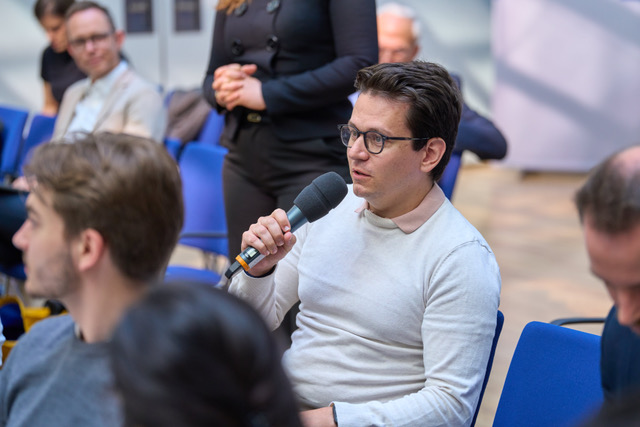
LLMs are trained in unregulated settings. What happens when misinformation from platforms like X or Reddit becomes the “truth” in training data?
This is a real threat. Disinformation, if not addressed, could become the foundation of future AI models. The EU has already taken steps, but more must be done – both technologically and politically.
On the regulator side, we need to influence user behavior. Just like with junk food, harmful content may remain available – but we must educate and create responsible consumption habits.
On the tech side, the race will never be fully won. Therefore, trust and verified communication channels are crucial, especially in business. If internal communication with suppliers and partners becomes untrustworthy, the global economy could face collapse. In emergencies, secure communication must fall back on personal verification of trusted third parties. A “zero-trust” scenario must be considered.
Given our reliance on foreign providers for digital infrastructure, can we truly speak of European sovereignty?
There are already European solutions. The problem is that we still invite companies like Google and Microsoft to the table. An open-source path could be the “European way”. In the Baltics, this is already reality. In Germany only one federal-state – Schleswig Holstein – has moved toward open-source systems.
Open source is more than ideology; it offers resilience. Even if a provider disappears, the code remains usable. Europe should develop an open-source ecosystem – not 27 fragemented ones, but a single unified system.
What medium-term threats do we face from non-state actors? Foreign governments often use proxies – hacker groups that operate under the guise of cybercriminals. These actors carry out sabotage and espionage, especially targeting sectors like biotech. This is documented, for example, in Germany’s BSI reports. While labeled “cybercrime”, these are often acts of political and economic warfare.
—————————————
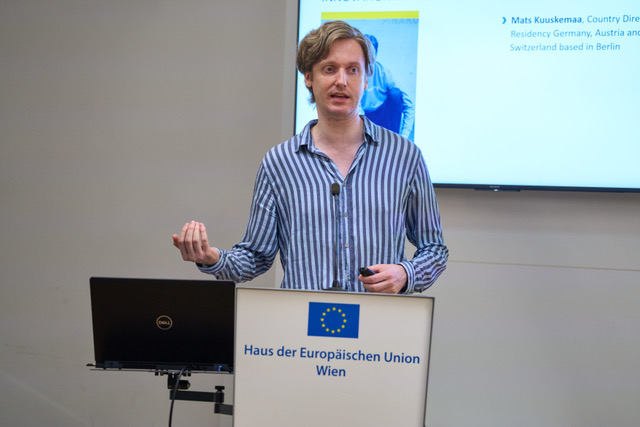
The Impulse “Estonia: Creating a Start-Up Ecosystem for European Innovation in Tech” by Mats Kuuskemaa, Country Director e-Residency Estonia, guided the participants through Estonia’s recent history, its start-up ecosystem, and the concept of e-Residency. Over the past two decades, Estonia has developed a unified digital system that enables citizens to interact with the state for government services with remarkable efficiency.
In the early 1990s, Estonia faced a unique challenge: the economy was in a dire state, and the country needed to catch up with its more prosperous neighbor, Finland. The population was motivated and hungry to build new institutions and systems, drawing inspiration from global best practices. In this context, Estonia saw an opportunity to leap ahead.
By contrast, in Germany, there appears to be a lack of urgency or ambition. The system works, so there is little drive for improvement. But Estonia’s experience shows that adversity can foster innovation. Our legal system is based on German law, and our economic model was shaped by the IMF. In just three years, Estonia transitioned from full-scale communism to a free-market economy. While many businesses failed during this time, the economy eventually saw 7.7% growth sparring a dynamic business environment.
One area where Estonia could not copy others was digitalization. What began as a bold idea – to bring all government services online – was gradually implemented. E-tax systems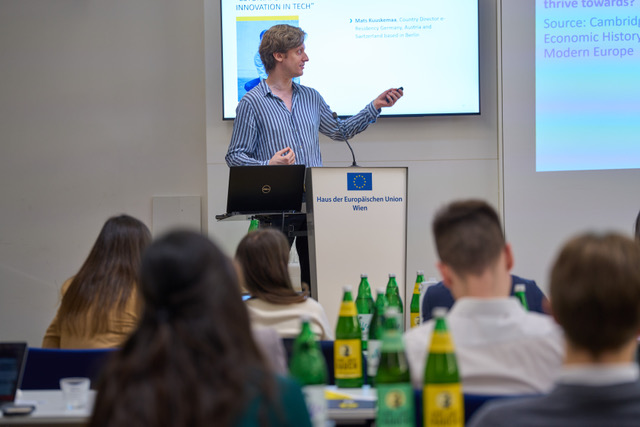 were introduced, followed by digital elections, which have increased liberal voter turnout and boosted participation among younger generations.
were introduced, followed by digital elections, which have increased liberal voter turnout and boosted participation among younger generations.
It’s important to note that digitalization does not mean replicating bureaucratic processes online. It means rethinking systems from the ground up to make them more efficient. Civil servants in Estonia now focus on meaningful work instead of paperwork. Estonia even established an e-notary system and a data embassy in Luxembourg, ensuring access to national data even in times of crisis.
Estonia also has a unique corporate tax system: profits reinvested into the country are tax-free, which supports small business growth. The tax system is simple and time-efficient, allowing entrepreneurs to focus on building rather than compliance.
What is e-residency? E-Residency is a government-backed initiative that opens Estonia’s digital ecosystem to people around the world. It was initially envisioned as a tool for security and trust, and every applicant undergoes a background check. Today, roughly half of the e-Residency community comes from EU countries. It offers a streamlined way for entrepreneurs to quickly establish cross-border businesses and collaborate across ecosystems.
Estonia is one of the easiest countries in which to launch a company. In our start-up ecosystem, it is standard practice to grant employees stock options – something rarely feasible in many other EU countries. Without this, people often work for years in start-ups and leave with nothing, which is a lost opportunity.
Flexible labor laws are also crucial for start-ups and SMEs. They reduce hiring risks and allow companies to adapt quickly, which contributes to Estonia’s low unemployment rate. These conditions also make it easier for international talent to relocate.
In Estonia we’ve developed laws tailored to start-ups, including regulations for AI and venture capital. Investing in Estonian companies is straightforward, transparent and digital. Today, Estonia boasts around 10 unicorns – among them Wise, Bolt, Zego, Glia, Gelato and Skype. In comparison, a larger and wealthier city like Hamburg has only two.
This suggests that “hunger” and a low cost of failure are key ingredients for entrepreneurial success. As an e-resident, you can start your company immediately.
Estonia’s main competitors in ease of business formation include the US (especially Delaware) and Portugal. However, tax complexity in these countries can be a major deterrent. The time spent on tax compliance is time not spent on business development. Estonia’s system, by contrast, is fast and efficient. Our global e-Residency community has added significant diversity and innovation to the country.
Q&A
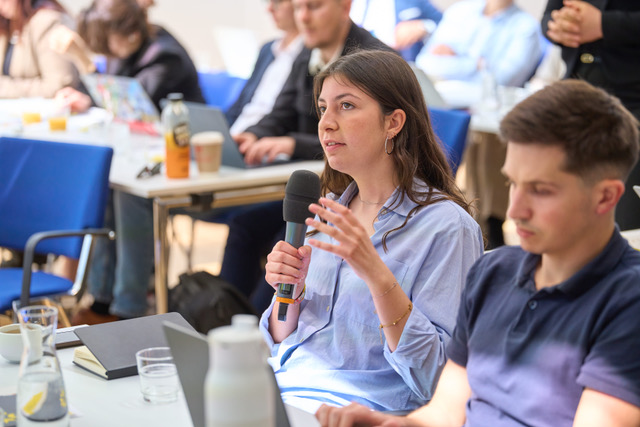
Success often invites criticism, especially from geopolitical adversaries. In 2007, Estonia experienced a large scale cyberattack that served as a wake-up call. Since then, NATO has established the Cooperative Cyber Defense Centre of Excellence in Tallinn. What is the scale of cooperation between Estonian startups and the government in the sphere of cybersecurity and cyber-resilience. How can Estonia improve the security situation for Europe in the Cyber-domain?
Estonia now maintains a high level of cyber-resilience and has developed a private-sector cyber army capable of responding to attacks in real-time. The country prioritizes cybersecurity at both governmental and business level. Our use of physical e-Residency ID cards and verification codes has helped reduce identity theft significantly.
Why haven’t other countries adopted e-Residency?
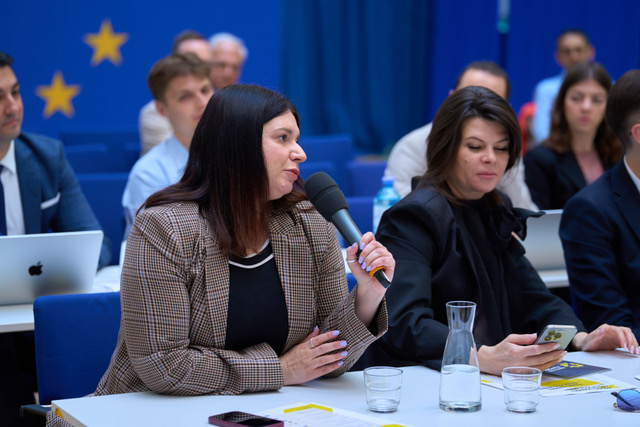
Some countries have begun to explore similar models – Dubai and Portugal, for example. However, Estonia’s program remains unique in that e-residents do not need to live in Estonia to benefit from its services. While other initiatives exist, Estonia retains first mover advantage and global recognition for its e-Residency concept.
Do you think that the mindset in Estonia is different from the mindset in for example Germany?
Culture and mindset play a significant role. Estonia wants Germany to thrive -our neighbor’s success is linked to our own. While Germany is making progress in digitalization (e.g., e-prescriptions), efforts are fragmented due to the federal structure, resulting in data silos and inconsistent integration.
True digital transformation must start with the user experience. Legislation should be designed with users in mind. Unfortunately, in many countries, the debate is overly focused on data protection at the expense of usability. Until decision-makers shift their perspective, true progress will be limited.
You can view the full seminar here. We thank Professor Wittpahl and Mats Kuuskemaa for their participation.



